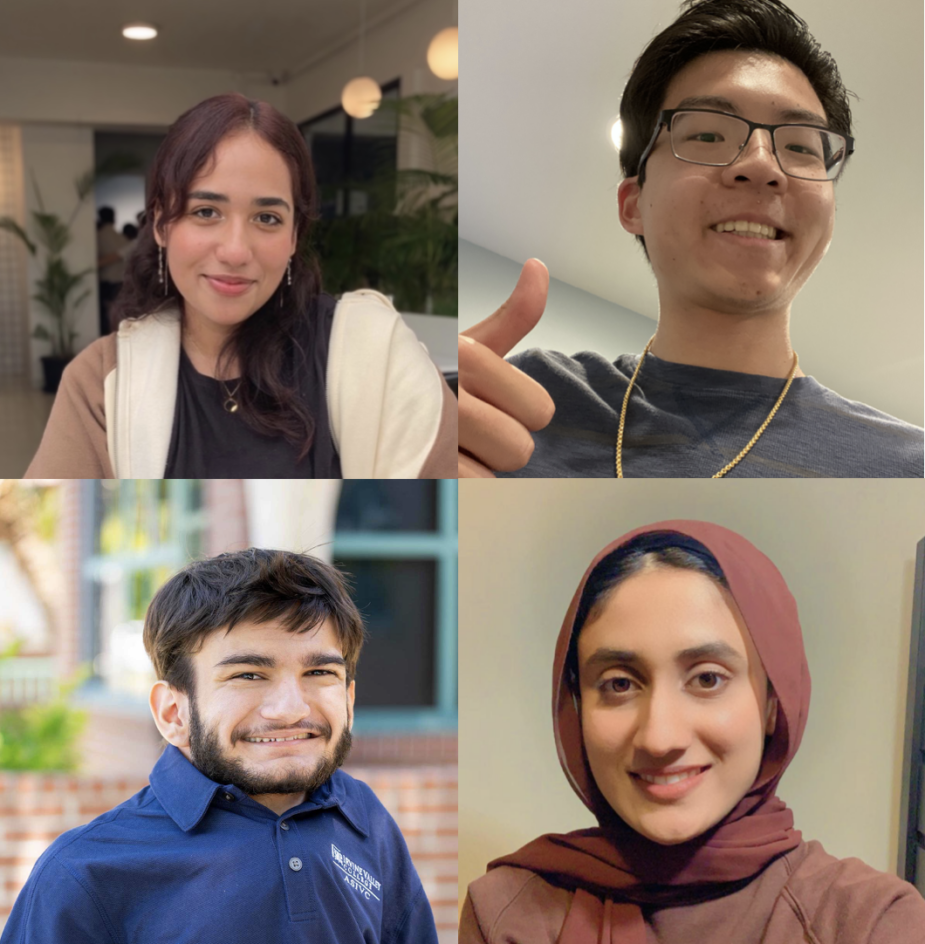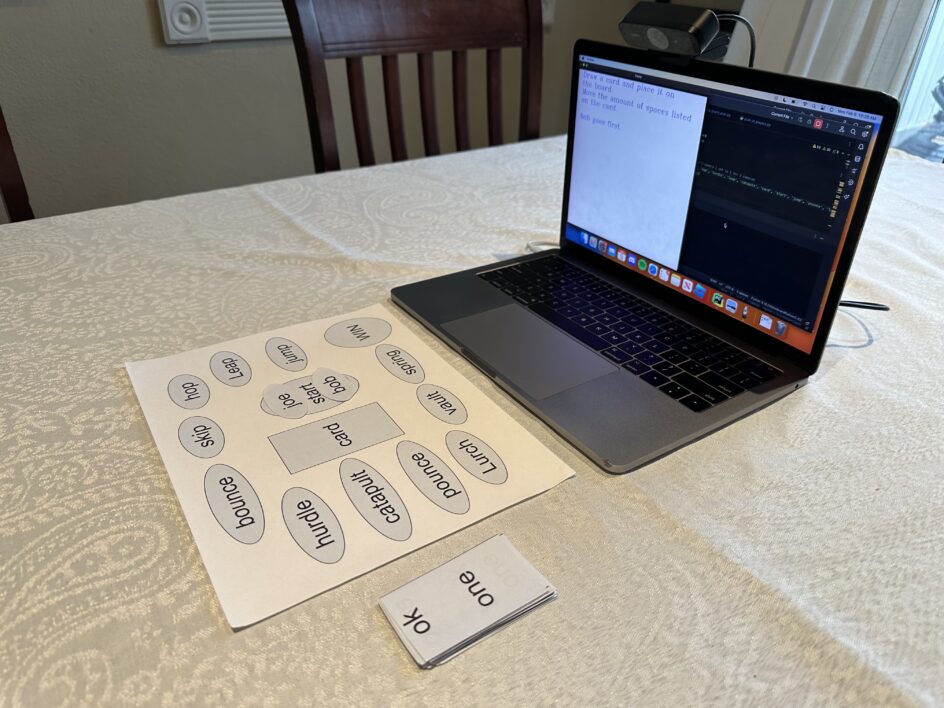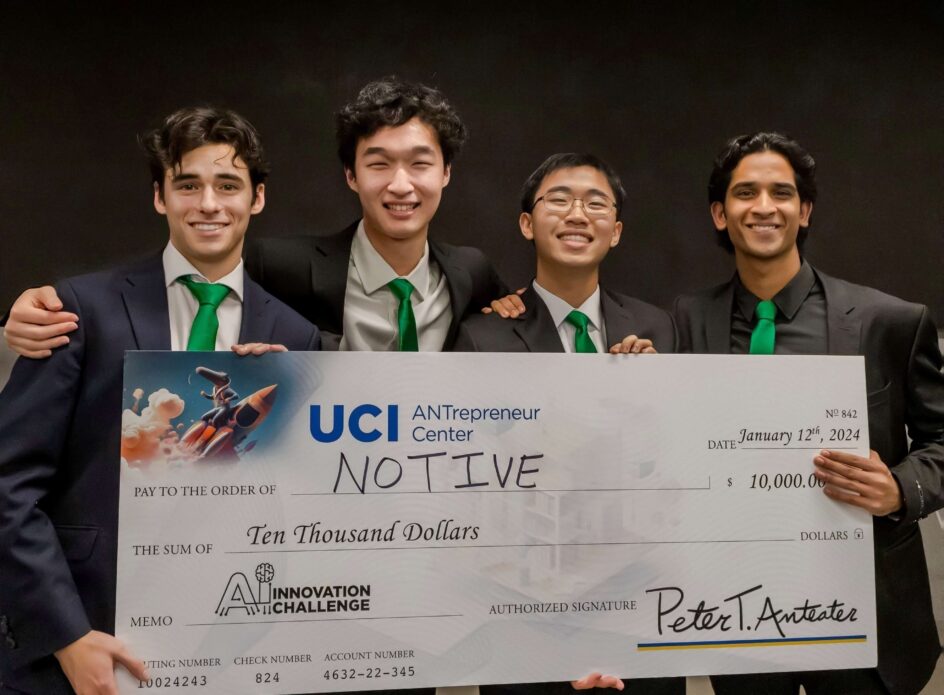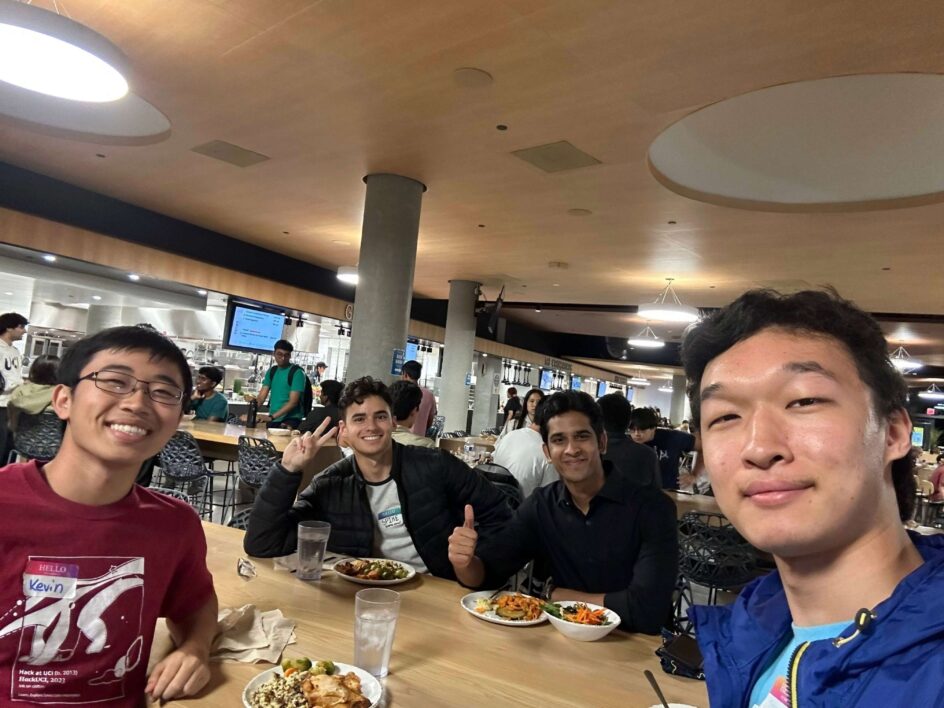ICS Students Win First Place at UCI ANTrepreneur Center AI Innovation Challenge
The UC Irvine ANTrepreneur Center’s three-month AI Innovation Challenge concluded on Jan. 12, 2024, with two teams of students from the Donald Bren School of Information and Computer Sciences (ICS) securing first place in the AI in Storytelling & Entertainment and AI in Student Experiences tracks.
AI in Storytelling & Entertainment: Vision Board

Recognizing that storytelling is both about the narrative and its immersive experience, the Vision Board team, comprised of third-year computer science majors Derek Yazan, Jadon Ark, Souzen Khan and Fatima Waqar, placed first in the Storytelling & Entertainment track for using AI to merge physical board games with online video games.
“Our technology uses an AI computer vision-equipped camera to track pieces on a board and communicate this information with a computer to display video and play audio in real time,” says Yazan. “Vision Board’s technology can add an entire new dynamic to how we interact with board games in a way that further immerses players in their stories.”
Ark shares that the team was inspired to use AI to “enhance humans’ storytelling abilities, rather than replacing it.” They began by brainstorming use cases for Vision Board before moving onto programming.
During the programming stage, the team discovered that the color detection software they planned to use in their computer vision system was unreliable due to its numerous limitations.
“We pivoted to utilizing text recognition as the primary tool to track the board and all of its pieces in real time, which turned out to be the right choice. From this minor setback, we learned the importance of adapting to a challenging situation and not being afraid of scrapping an idea and restarting,” says Khan.

The obstacles they faced while building Vision Board have only made them more ambitious and resilient. Now that they have a functional demo of Vision Board, their sights are set on advancing their technology and one day using it in an original board game.
They also say they thoroughly enjoyed the process of developing Vision Board despite the hiccups. For the team, it was an opportunity to apply the technical skills they gained in their ICS courses to a real-world project, which Waqar believes is a “very satisfying experience.”
“Programming a software that directly interacts with the physical environment made our team feel like we were actually creating something real and tangible, which are the same two qualities that we want to highlight through our games,” says Waqar.
As they reflect on the past three months of creating Vision Board, Yazan adds that they feel proud of themselves. The team initially thought their audience was disinterested in their project, but they were quickly proven wrong.
“It wasn’t until after the [final] presentation and award ceremony that we realized that there were people who believed in our idea,” says Yazan. “Our advice to students is to continue to work hard towards your aspirations, even if you feel like you don’t have enough support at this stage. Eventually, there will come a point where you will be able to reap the rewards of your hard work.”
Watch the Vision Board pitch.
AI in Student Experiences: Notive

Built by first-year business information management major Sahas Sagar Rao Kusaganti, computer science majors Spike O’Carroll and Kevin Wu and computer science and engineering major Steven Cao, Notive is “the note-taking app that helps students remember what they learn.”
“It captures key points that you missed during lectures, reformats your disorganized notes into a neat document and generates study materials directly from your notes,” says Kusaganti. “Our goal is to create a future where AI improves our ability to learn, rather than acting like a crutch or a shortcut. Notive is our attempt at making that future a reality.”
The Notive team spent three months creating the app, from ideation to development. They attribute their success to their technical aptitude, which they developed as ICS students through their coursework and involvement in ICS clubs.
“We all had a dedication and history in building either artificial intelligence or student experience products, which made our partnership the perfect blend of ideas to win the Student Experience track of the competition,” says Wu.
Cao also believes the team worked well together because they were passionate about what they were building, which he says “makes the boring parts fun and the tiring parts easier.”
“The most memorable part of building Notive was, perhaps ironically, our late-night Discord calls, split across continents and timezones, but united by our mission to bring Notive to life. Through these multi-hour conversations, we shared many funny and tiring moments collaborating on code, laughing about life, and talking about the future,” says Cao.

As they worked day and night to create Notive, they gathered feedback from students, educators and administrators, including Trace Yulie, Director of the Learning and Academic Resource Center, and Tom Andriola, Vice Chancellor for Information Technology and Data and Chief Digital Officer.
According to Cao, the team encountered difficulties in gauging the market viability of Notive; however, their research and conversations with stakeholders led them to discover a “void” in education that only a tool like Notive can address.
“We saw a serious gap in the market for a tool like Notive — other AI note-taking apps take notes for you, instead of helping you write better notes yourself. These apps appeal to a more general audience, but for us students, taking notes ourselves is crucial to truly learn and retain information,” says O’Carroll.
Now, he adds, the team is focused on getting “Notive in the hands of more students.”
“We’re so excited about Notive’s potential, and we can’t wait for what’s next!” says O’Carroll.
Watch the Notive demo video.
— Karen Phan